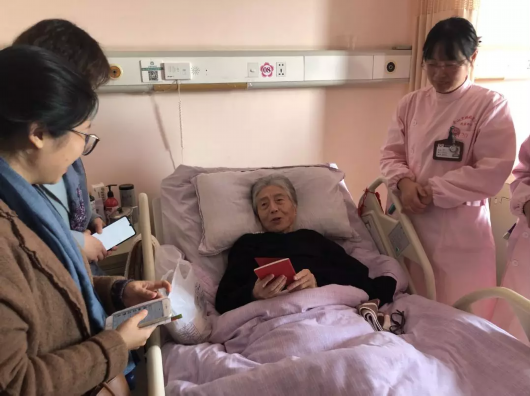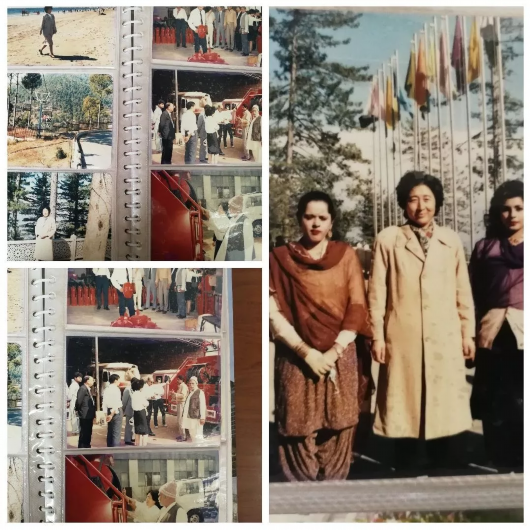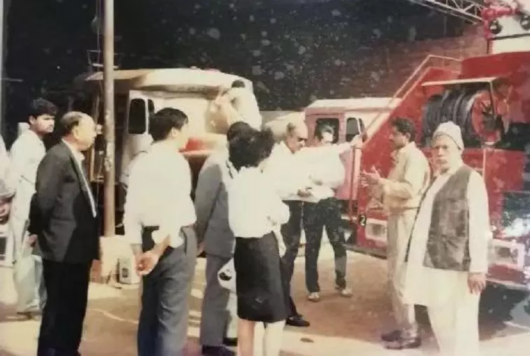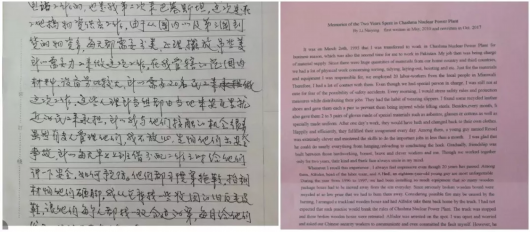
(Photo/Li Jun jie)
The lady pictured above is 79-year-old Li Naiying. Now she is hospitalized in a community health center in Shanghai’s Jinshan District. Though confined in bed, she still looks spirited and likes to tell her story of life in Pakistan to the people around her. Her wish is to let more people know about China-Pakistan friendship.
Li began to work in Jinshan in 1975. In the 1990s, she was recruited to the national engineering team to be dispatched to Pakistan. Their job was to help the Pakistanis build a nuclear power plant.

(Li Naiying in Pakistan)
On March 18, 1995, Li, who was near retirement age, set off from Shanghai to the northern town in Pakistan, contributing her remaining energy to the construction of Pakistan’s first nuclear power plant.
The plant was based on the model of the Qinshan Nuclear Power Plant in China’s Zhejiang province. Before the power plant opened, there was little electricity in Pakistan. Li witnessed the construction project of the Chashma Nuclear Power Plant from zero to one. Up to now, with the help of generations of Chinese engineers, three nuclear power plants have been erected in Pakistan.

(Li and her colleagues in Pakistan)
On the second year of Li’s arrival in Pakistan, she reached her retirement age. But she refused to go back to China and insisted on fulfilling her responsibility. During her two years abroad, Li was never united with her husband or family. She said with pride: “Though our country was not rich at that time, Chairman Mao Zedong said that we had to help Pakistan. I felt honored to work there. At that time, people were simple. We all went to Pakistan with the same intention: to help our brothers overcome difficulties.” Even though that was over 20 years ago, Li’s memory about the experience is still fresh.
The brotherhood could also be felt in how the locals treated the Chinese people with hospitality. As Li recalled, the Pakistanis also offered the Chinese their helping hands. Once, on their way to the dormitory, Li and her colleagues had a car accident. Stuck in the car, Li lost a lot of blood. Upon seeing them, some passers-by did not hesitate to come up and save them. They called Li “Granny” repeatedly, to keep her sober-minded. As Li said, those people saved her life. The next day, to Li’s surprise, many locals waited in line in the hospital to donate blood to her.
Speaking of that, “Granny” Li sobbed with tears in her eyes.
“The locals were very kind.” According to Li, the income in Pakistan was low despite the high price of commodities. But in spite of their living pressure, the unsophisticated local people were willing to give away the vegetables and fruit they grew to the Chinese workers at the nuclear power plant.

(Li wants her article to be published)
Ten years ago, Li wrote an article to express her gratitude to the Pakistanis. But she did not find any chance to get it published. Now, the lady’s biggest wish is to get it translated and published. She wants the Pakistanis to know that she has never forgotten their kindness to her.
Her entire life, Granny Li has been a person ready to help others. She said she has lived a life without regrets. As she wishes, her organs will be donated after death. Her husband, under her influence, has decided to do the same.
